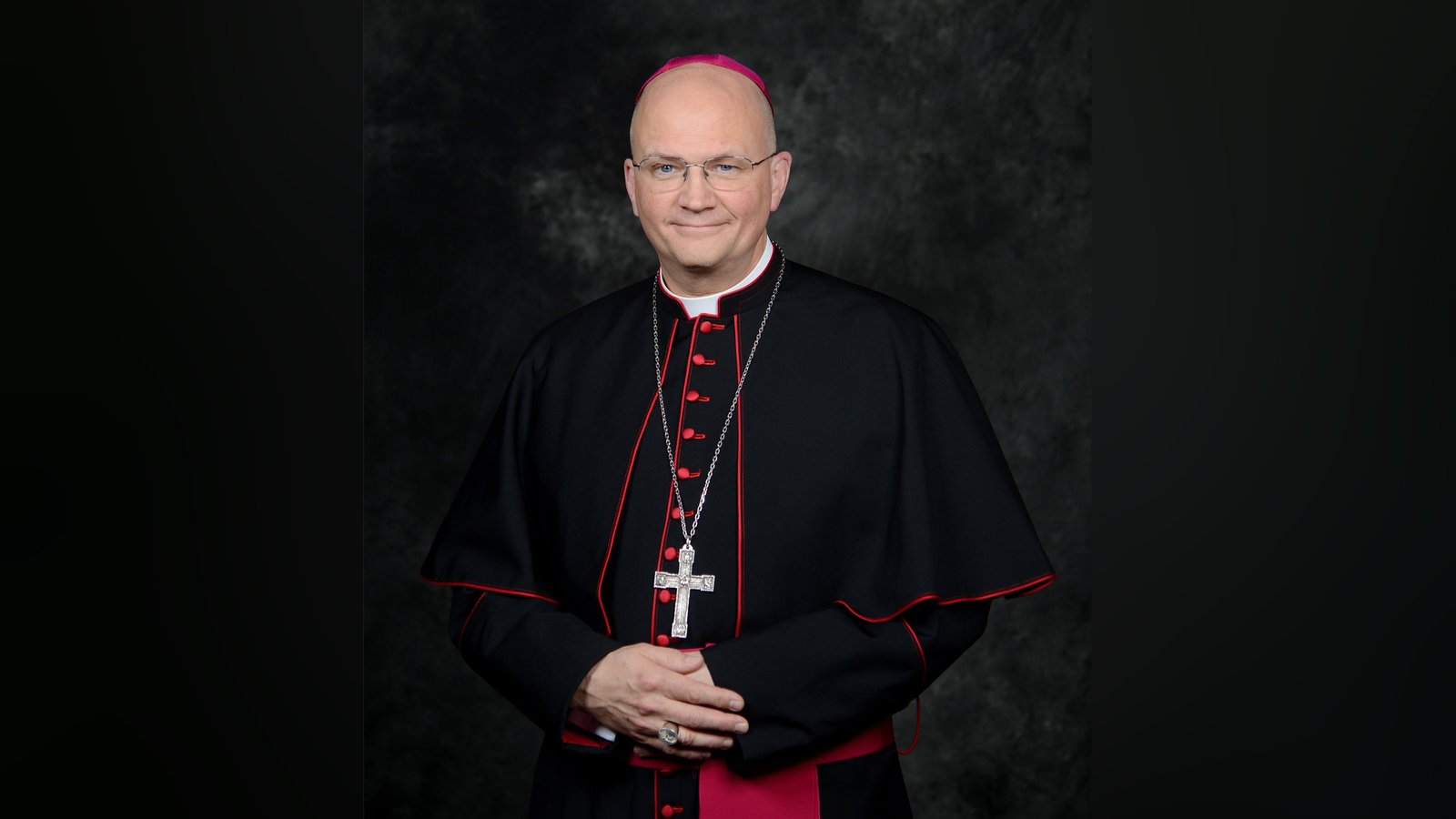The current bishop of Tucson, Arizona, Archbishop-elect Weisenburger to succeed Detroit Archbishop Allen H. Vigneron
DETROIT — Pope Francis has named Bishop Edward J. Weisenburger as the sixth archbishop of Detroit, the Holy See announced early Feb. 11.
Archbishop-elect Weisenburger, 64, is the current bishop of the Diocese of Tucson in southern Arizona. He will succeed Archbishop Allen H. Vigneron, 76, who has been chief shepherd of the Archdiocese of Detroit since 2009.
Archbishop Vigneron’s resignation — which he offered to the pope upon his 75th birthday Oct. 21, 2023, as required under canon law — was accepted by the Holy Father.
Archbishop-elect Weisenburger will be installed as Detroit’s archbishop during a solemn Mass at 2 p.m. March 18 at the Cathedral of the Most Blessed Sacrament in Detroit. Upon his installation, Archbishop-elect Weisenburger will assume pastoral responsibility for Michigan’s largest diocese and metropolitan see, which is home to more than 900,000 Catholics, 213 parishes and 81 Catholic schools.
Pope Francis has appointed Archbishop Vigneron as apostolic administrator of the Archdiocese of Detroit until Archbishop-elect Weisenburger’s installation.
Archbishop Vigneron will introduce Archbishop-elect Weisenburger to Detroit’s faithful during a news conference at 10 a.m. Feb. 11 at Sacred Heart Major Seminary in Detroit. The news conference will be livestreamed.
“On behalf of all the people of God in the Archdiocese of Detroit, and in my own name, I extend to Archbishop Weisenburger a heartfelt welcome to his new home,” Archbishop Vigneron said in a statement. “I offer the assurance of our prayerful support as he comes here to take up the mission being given to him by our Holy Father Pope Francis.”

Archbishop-elect Weisenburger said he embraces the Holy Father’s call to come to Detroit and looks forward to getting to know God’s people in the Motor City.
“The Archdiocese of Detroit is a Church steeped in rich history, vibrant ministries, and known for a committed clergy with a great passion for evangelization,” Archbishop-elect Weisenburger said. “I am humbled to be called to serve such a noble Church. Despite the challenge of leaving my happy home in the Diocese of Tucson, I promise the good people of the Archdiocese of Detroit my all.”
Archbishop-elect Weisenburger expressed gratitude to Archbishop Vigneron, noting the retiring archbishop’s distinguished service not only to the Archdiocese of Detroit, but also on the national level, including as vice president of the U.S. Conference of Catholic Bishops from 2020 to 2022.
“I am exceptionally grateful to Archbishop Vigneron for the warmth, kindness, and encouragement he expressed to me immediately upon learning of my assignment,” Archbishop-elect Weisenburger said. “His generous assurance of a warm welcome and his desire to be of fraternal help to me is a true blessing. It is my hope that his retirement will be marked by length of years, robust health, and many rich blessings.”
Archbishop-elect Weisenburger has served the Tucson diocese since 2017, and previously served as bishop of Salina, Kansas, from 2012 to 2017.
The archbishop-elect’s episcopal motto is “Behold the Lamb of God,” referencing St. John the Baptist’s words proclaiming Jesus’ identity in John 1:29.
Archbishop-elect Weisenburger was born Dec. 23, 1960, in Alton, Illinois, the third of four surviving children of Edward John Weisenburger and Asella (Walters) Weisenburger. He grew up primarily in Lawton, Oklahoma, living briefly in Kansas and Texas as the family moved to follow his father’s military career.
Upon graduating high school, he entered Conception Seminary College in Missouri, graduating with honors in 1983. He was then sent to study at the American College Seminary at the Catholic University of Louvain in Belgium, earning a Pontifical S.T.B. in Theology, along with an M.A. in Religious Studies and a Master’s in Moral and Religious Sciences.
He was ordained a priest of the Archdiocese of Oklahoma City on Dec. 19, 1987. After serving as parochial vicar of St. Mary Church in Ponca City for three years, he was sent to study canon law at the University of St. Paul in Ottawa, Canada, earning a pontifical J.C.L. degree in 1992.
Upon his return, Archbishop-elect Weisenburger was appointed vice chancellor and adjutant judicial vicar of the Oklahoma City archdiocese, in addition to weekend parish and prison ministries. In the aftermath of the April 19, 1995, bombing of the Murrah Federal Building in Oklahoma City, he served as an on-site chaplain to first responders and rescue workers.
Over the next two decades, Archbishop-elect Weisenburger served in a number of other roles in the Oklahoma City archdiocese, including as vicar general and a member of the Council of Priests, Archdiocesan College of Consultors, Seminarian Board and as an officer with the Archdiocesan Tribunal.
During that time, Archbishop-elect Weisenburger served as pastor of two parishes: Holy Trinity in Okarche from 1995 to 2002, and the Cathedral of Our Lady of Perpetual Help in Oklahoma City from 2002 to 2012. He was named a Prelate of Honor to His Holiness by Pope Benedict XVI on Oct. 2, 2009.
Holy Trinity, nestled in a rural farming community, was the home parish of Blessed Stanley Rother, an Oklahoma priest and missionary who was martyred in Guatemala in 1981. While serving at Holy Trinity, Archbishop-elect Weisenburger got to know the Rother family, and later became promoter of justice for the missionary priest’s canonization cause.
On Sept. 23, 2017, Blessed Rother became the first U.S.-born man to be beatified, just two months before Detroit’s own Blessed Solanus Casey.
On Feb. 6, 2012, Pope Benedict appointed Archbishop-elect Weisenburger as the 11th bishop of Salina, a rural diocese of about 42,000 Catholics in central Kansas. Five years later, Pope Francis appointed him as the seventh bishop of Tucson on Oct. 3, 2017.
Coming from the geographically expansive Diocese of Tucson — which has approximately 400,000 Catholics over about 42,000 square miles in the nation’s Sun Belt — to the Archdiocese of Detroit, which serves a Catholic population more than twice that size over about 4,000 square miles in the heart of the Midwest, will be an adjustment, Archbishop-elect Weisenburger acknowledged.
While the weather might be a bit chillier in Michigan — about 20 degrees as opposed to about 75 degrees in Tucson on Feb. 11 — Archbishop-elect Weisenburger is sure to receive a warm welcome in Detroit.
The future Detroit archbishop expressed his appreciation and gratitude for Pope Francis’ appointment and confidence, noting “there is a grace to be found in responding ‘yes’ to what the Holy Father asks of us.”
Archbishop-elect Weisenburger said Pope Francis’ witness — especially his emphasis on the kerygma, the central Gospel message of salvation — is an “immense” source of inspiration in his own ministry.
“In the example of his life, our Holy Father has allowed the light of the Gospel to shine in a unique way. I especially see this in his consistent call for us to move beyond the shallow values and dreams of a world wounded by secularism, to a life of deep meaning, purpose, and redemptive love,” Archbishop-elect Weisenburger said. “This is what discipleship is all about, and I believe he witnesses to this primarily by the prophetic way he lives his own life.”
Similarly, Archbishop-elect Weisenburger said the examples of Pope Benedict, Pope St. John Paul II and Pope St. Paul VI shine in the modern Church.
“I believe it is a sign of the Holy Spirit at work within the Church that each man was, in a sense, the right man at the right time in the life of the Church,” he said. “The gifts each man brought to the Universal Church in his life and ministry have impacted our Church in wonderful ways.”
With Archbishop-elect Weisenburger’s appointment, Archbishop Vigneron becomes archbishop emeritus of Detroit, a title he shares with Cardinal Adam J. Maida, who will turn 95 on March 18, the same day as Archbishop-elect Weisenburger’s installation.
A priest of the Archdiocese of Detroit who later served as a Detroit auxiliary bishop and bishop of Oakland, California, before returning home in 2009, Archbishop Vigneron led the local Church through a missionary transformation, including a 2016 synod in which more than 400 clergy, religious and laity gathered to pray and discern the Holy Spirit’s will for the archdiocese. In 2017, he released “Unleash the Gospel,” a roadmap for the missionary conversion of the Archdiocese of Detroit and a repository of the synod’s graces.
“I count myself blessed by God, far beyond what I deserve, to have served for these past sixteen years as the principal pastor of the archdiocese,” Archbishop Vigneron said. “It has been the joy of my life to lead this local Church in responding to the Lord’s commission to share his Good News of salvation.”
In addition to his service in Detroit, Archbishop Vigneron has served the Church in numerous national posts and on several boards and commissions. Before his term as vice president of the U.S. Conference of Catholic Bishops from 2020-22, he served as secretary of the bishops’ conference and as chairman of the USCCB’s Committee on Doctrine, among other roles.
Archbishop-elect Weisenburger currently serves on the U.S. bishops’ Committee on the Protection of Children and Young People and has previously served on the Committee for Migration and the Subcommittee of the Catholic Communication Campaign.
The newly appointed archbishop also is the episcopal moderator for the National Association of Church Personnel Administrators (NACPA), a member of Chicago’s Mundelein Seminary Board, and a past president of Catholic Rural Life, an organization promoting Catholic life in rural America. He is a fourth-degree member of the Knights of Columbus and a Knight Commander with Star in the Equestrian Order of the Holy Sepulchre of Jerusalem.
Copy Permalink
Archdiocese of Detroit Episcopal transition











